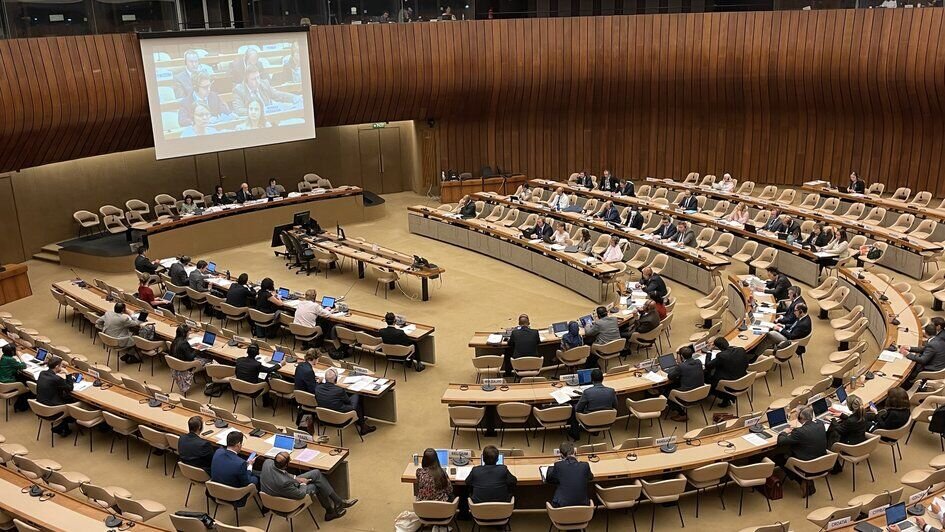Iran to preside over Conference on Disarmament

TEHRAN- The Islamic Republic of Iran will serve as chair of the UN Conference on Disarmament (also known as CD) on next Monday (March 18).
The conference, which serves as the only platform for international negotiations on disarmament, will be divided into three sections in 2024: January 22–March 28, May 13–June 28, and July 29–September 13.
Iran will chair the meeting twice, from March 18 to 29 and May 13 to May 24. The summit will also be presided over by the Israeli regime, Iraq, India, and Ireland.
The UN Office in Geneva released a press release stating that among other things, the conference’s agenda this year includes topics such as ending the nuclear arms race and disarmament, preventing nuclear war, implementing a comprehensive disarmament program, and transparency in armaments.
Iran’s participation in CD 2024
Iran’s Foreign Minister Hossein Amir Abdollahian delivered a speech at the high-level portion of the conference, which took place from February 26 to March 1. In it, he criticized the use of “double standards” by international organizations when it came to disarmament.
When it came to the Israeli regime, which the senior Iranian diplomat regarded as an immediate threat to people in Palestine, West Asian region, and the entire globe, he specifically denounced those measures.
“The international community should take this threat seriously and make a decisive decision over the unprecedented threat which this occupying, apartheid and warlike regime is posing to global peace,” Abdollahian added.
The Iranian envoy urged the international community to put an end to Israel’s crimes against the Palestinian people in Gaza, including genocide, and to make the regime responsible for its crimes.
In addition, he called for the total abolition of the regime’s nuclear weapons and the placement of all its nuclear installations under the IAEA’s safeguards and oversight.
The U.S. and EU are supplying the most weapons to West Asia, including to Israeli regime, as the Gaza war threatens to ignite a regional conflict.
The U.S., France, Italy, and Germany together supplied 81 percent of west Asian arms imports in the 2019-2023 period, said the Stockholm International Peace Research Institute (Sipri), a Swedish think-tank, on Monday.
The U.S. supplied the lion’s share (52%). The West’s biggest buyers were its allies Egypt, Kuwait, Qatar, and Saudi Arabia — Qatar boosted imports 396 percent in the past four years, becoming the world's third-largest arms buyer.
Israel was the world's 15th-biggest importer and “the U.S. accounted for 69 percent and Germany for 30 percent of arms imports by Israel,” Sipri said.
The fresh data came out amid Israel’s mass-killing of Palestinians in the Gaza war, which saw calls for an Israel arms-embargo by humanitarian groups, activists, and protesters in several EU states.
The U.S. supplies ammunition and combat aircraft being used by Israel in Gaza.
Germany’s biggest deal involved four submarines, but the Israeli regime has also requested to buy 10,000 German tank shells since the Gaza war began on October 07, 2023.
“At the end of 2023, the U.S. rapidly delivered thousands of guided bombs and missiles to Israel,” Sipri said.
“Major arms imported in the past 10 years have been used widely in conflicts in the region, including in Gaza, Lebanon, and Yemen,” Sipri researcher Zain Hussain also said.
“Some states in the Gulf region have imported large volumes of arms ... to counter Iranian influence,” he added.
Meanwhile, according to the latest EU figures on the subject consulted by EUobserver, France, Romania, the Czech Republic, Italy, and the Netherlands were also top exporters to the Tel Aviv regime.
The Czechs, Germany, and Slovakia granted export licenses for over €10m of “ammunition” to Israel in 2022, the EU report said.
Germany, France, the Netherlands, and Portugal granted Israel-export licenses for €23m of “bombs, torpedoes, rockets, missiles”, the EU said.
“Israel can’t fight this war without Western missiles and artillery shells,” Robert Baer, a U.S. expert said.
